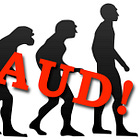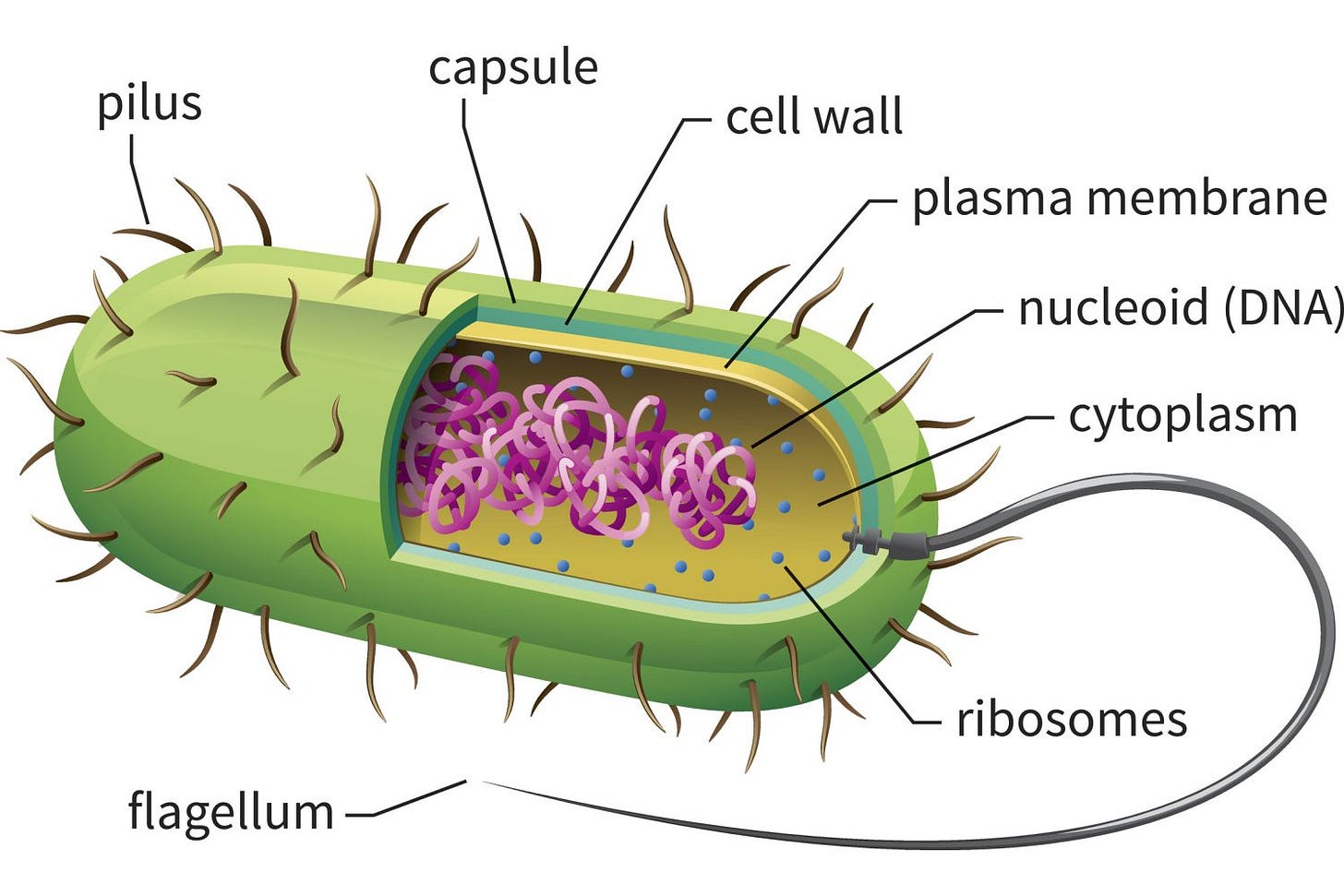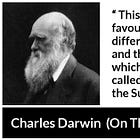'Evolution' and non-science. A look at bacteria and proteins.
Evolution offends real science. It is word salads, rhetoric and metaphysics.
“It is dangerous to be right in matters where established men are wrong.” Voltaire in "The Age of Louis XIV", 1751.
The word salads
Evolution is a philosophical enterprise premised on ‘natural selection’, mutations, time and materialism. Evolution as the only default answer for any biological process, explains precisely nothing. As with ‘climate change’, any activity or result is due to ‘evolution’. It cannot of course explain the creation of life, our world, or why there are 2 million species with such finely tuned and wonderfully designed systems.
Darwin’s word salads explain everything and therefore mean nothing:
Did the organism flourish? It was naturally selected of course, given its ‘competitive advantages’.
Did it die out? It was selected to expire and become extinct. It was ‘uncompetitive’.
Did that species thrive and conquer its competitors? It possessed competitive advantages due to mutations and genetic allele shuffling.
Did that species go extinct? It was not competitive enough and the functional accretions of allele shuffling failed in comparison to its competitors.
Why does that fossil body plan exactly ressemble the same creature today? Due to punctuated equilibrium there was a sudden change in structure but given that it was perfectly adapted there ensued stasis and equilibrium. Trust us, this fossil is 14 billion, trillion, brazilian years old.
No facts, no mechanical proofs, just rhetoric. Harvard’s Richard Lewontin (an atheist, materialist) once wrote:
“the theory (Darwinism) becomes a vacuous exercise in formal logic that has no points of contact with the contingent world. The theory explains nothing because it explains everything.”
Lewontin is spot on.
Untestable claims
As Karl Popper and others have pointed out, a valid hypothesis can be tested and disproven. This is impossible with the Darwin religion. Any output, any observation, any fossil, any gap, any biological development or non-development, is supportive of its religious tenets.
If you ask a Darwinian “how did the human brain ‘evolve’?”, the answer from the religious acolyte will be something along these lines:
‘we don’t know exactly how the brain ‘evolved’, but obviously the bacteria to human ‘evolution’ over time, occurred through simple, single functional accretions, driven by natural selection, genetic drift, and mutations which produced a random aggregation of atoms and material to make the brain possible. The brain exists. Therefore, evolution is true.’
The Darwinian explanation for any biological process is devoid of science and pregnant with rhetoric, tautology, unproven claims and nonsense.
None of the above postulations which you find in any evolutionary discourse, is based on science, mathematical probability, logic, observation or common sense. Therefore, it is simply anti-science to state that bacteria became Bach. Bacteria never change. Bacteria will always remain bacteria and revert back to a mean.
Mean reversions
I have written elsewhere based on Bechamp’s original 1860s observations, that bacteria are pleomorphic, meaning they change both shape and function. This pleomorphism is related to why we become ill due to toxins and environmental changes. Despite form and functional changes bacteria always remain bacteria.
The French zoologist Pierre-Paul Grasse (1895–1985) spent a lot of time studying bacteria. A Darwinian-Lamarckian, Grasse asked: What is the use of their (the bacteria) unceasing mutations if they do not change? Grasse understood that the mutations of bacteria are merely hereditary fluctuations around a median position; a swing to the right, a swing to the left, but no final evolutionary effect. Despite pleomorphism they are still bacteria.
The largest experiment for the religion of Evolution is Lenski’s e-coli laboratory at Michigan State University, with over 60.000 generations of e-coli bacteria being ‘evolved’ and compared. This is regularly hailed by ‘The Science’ media as a resounding proof of evolution’s ‘power’ in ‘action’. This is ridiculous.
The e-coli after 60.000 generations, equivalent to 2 million human years, are still bacterial microbes. The only functionality difference is a loss of function, not a gain. Lenski’s 35-year experiment has disproved evolutionary theory in-toto. The bacteria did not ‘evolve’ into bats, badgers or beagles. Yet, you will hear nothing about it.
‘…..when trillions of bacteria replicate over 60,000 generations, numerous mutations are to be expected. Yet the most important “evolutionary” changes observed so far have involved the loss of old genetic functions rather than the acquisition of new ones.’ (in Bethel, ‘Darwin’s House of Cards’)
Homo Sapiens apparently diverged from apes some 5-7 million years ago and became modern man. Yet in an experiment comprising roughly one third of that time, there is no evidence whatsoever that bacteria can ‘evolve’ and meta-mutate into a new species. Apes are infinitely more complex than bacteria and Humans are even more complex than apes. So where is the proof that over 5-7 million years we went from apes sitting in their own faeces pounding nuts against a rock, to Humans using a laptop on the internet?
Magic makes You?
We can go back to basics. What is the mathematical chance that a human evolved from bacteria? It is of course less than zero. How did the Human brain ‘evolve’ from a single cell? A human brain has 80 billion neurons and each neuron is connected on average to 7.000 nodes. How does that massive complexity pop into existence over time from a bacteria? Please outline the steps with laboratory proof. The brain is just one organ. The average Human possesses:
50-70 trillion cells,
200 different types of cells,
6 feet of DNA per cell,
1 trillion atoms per cell,
2 million or more proteins (no one knows the number),
a programming language (amino acids, nucleotides),
interconnected organs, each with specified functionality,
lungs and respiratory networks,
the complexity of eyes integrated with neural networks,
ears which are testaments to perfect design,
a system of self-repair and maintenance,
an ability to not only self-replicate at the cellular level,
but also to generate the miracle of embryology and reproduction at the individual level,
and so much more…..
Yet I am told to believe that all of the above ‘evolved’ ‘slowly’ over time, through ‘allele shuffling’ and genetic ‘experimentation’, driven by ‘competitive advantage’ and ‘natural selection’. How would the ‘evolution’ of half a leg, half an ear or eyes, half a hand, half a heart, or half a brain confer a competitive advantage on an individual in this fantasy story?
Proteins, Maths and Logic
At a more basic level we can ask how did the DNA, RNA, proteins and amino acids found in a Human develop or self form from bacteria? To disprove this outrageous claim we can do an exercise in combinatorials. Let us start with just a single protein chain created by ribosomes and what can only be called a manufacturing process based on a design. Assume that the protein chain is about two hundred amino acids long. Many protein chains are much longer of course, but let us assume that 200 is the average length.
There are 20 different amino acids
The number of possibilities is 20 x the 200 amino acids in the chain
This is conveniently written as 20200 and is approximately equal to 10260 or 1 followed by 260 zeros!
Keep in mind that the protein chain composed of 200 amino acids is functional, with left-handed chirality….
10260 is quite beyond our everyday comprehension and is greater than all the matter in the universe. It is a complexity that cannot be modeled nor understood. This is only part of the problem. Richard Lewontin quoted above, has also pointed out the chicken-and-egg problem.
“The proteins of the cell are made from other proteins, and without that protein-forming machinery, nothing can be made. There is an appearance here of infinite regress (What makes the proteins that are necessary to make the protein?)”
Lewontin’s chicken and egg issue also references the manufacturing issue or in his words, ‘protein-forming machinery’. How did the ribosome machinery process of protein creation ‘evolve’ by chance? Which protein came first in this process and how?
Random Chancers
No one can answer Lewontin. We do know that the ‘random chance’ magic of Darwin’s ‘House of Cards’ cannot make amino acids, proteins or anything else. Chance does not create design.
Crick, the DNA double helix co-founder, and an ardent Darwin-materialist, believed that something as complex as a protein evolving by chance was highly improbable. So he started the “directed panspermia” cult which only repositions the problem of complexity to unknown origins somewhere in the universe (or multi-verses).
According to Crick once self-replicating bacteria originated somewhere in the universe, they could embed themselves into spaceships created by Chewbaca, ET and friends, and be spread through interstellar space. These aliens would arrive on Earth and seed our planet with the bacteria. Through some unknown and unproven process, a magical transformation then occurs and the bacteria become Brontosaurus and 1 million other fauna species. No mention is made by Crick on how flora ‘evolved’. His theory was “obviously very speculative,” he admitted. Thanks Mr. Science.
So Darwinists now look to the Death Star and Spock to save their theory.
A Victorian Philosopher
Darwin never worked, being part of the wealthy Wedgwood dynasty with inbreeding being blamed for his hypochondria and mental illness. He aspired to be famous in ‘science’ though he never studied or pursued a scientific education. He was a failed theology student, with a BA in Arts from Cambridge, who wished for renown in the then new and burgeoning industry of mid-19th century ‘science’. He was interested in pigeon and orchid breeding and it is from this managed breeding that he devised, based on the work and theories of others, his ‘natural selection’ whose poverty is assessed here.
In Darwin’s very simple view of the world, he substituted managed breeding with ‘nature’ and combined this with the Victorian principle of how markets best function (the invisible hand). Within ‘naturally selected’ breeding and laissez faire competitive dynamics, ‘nature’ will produce individuals and species who possess the right ‘traits’ and ‘variations’ and these will survive because they are tautologically, the ‘fittest’.
In Darwinism it appears that we have the complexity of life as a market competition or a sport, with ‘fitness’ never defined and the ‘natural selector’ which must be nature, taking on the role of a god. In reality survival in life is dependent just as much on luck and circumstance as ‘fitness’. The fact that Darwin provides no mechanical proof or even logic to support his claims dooms his philosophy and negates it from being considered a science.
Philosophy not science
The only conclusion an objective person can make is that the ‘science of Darwinism’ amounts to little more than a 19th century Victorian merger between 3 philosophies, namely; directed breeding, Malthusianism where rapidly exploding populations must compete for limited and scarce resources, hence the ‘fittest survive’, and ‘progress’ in a ‘laissez faire’ natural ‘market’ where superior ‘traits’ are selected for success and survival.
These metaphysical belief systems were much in vogue during Darwin’s Victorian era. The 19th century did not know anything about the complexity of cells, DNA, proteins or software systems. For Darwin the ‘cell’ was just a ‘globule’ of jelly. In fact a single cell is as complicated as a modern city. Yet the point remains that biological science has been diverted from reality because it venerates a philosophical theory based entirely on Victorian metaphyiscs.
We know that mutations destroy and that devolution is the natural end of all life and species. Every generation incurs some 30-50 mutational coding errors degrading the body’s operating system. Humans will eventually go extinct from mutations. We can therefore state with factual clarity: devolution is real, evolution is not.
We can also state with factual clarity that Darwinists cannot explain the arrival of bacteria, nor of a single Human protein. How much more complex and intricate is an entire Human than just a single string of 200 amino acides? How did the overwhelming and integrated complexity of a Human ‘evolve’ by chance?
A valid question to ask is: why is Darwinism considered to be a biological ‘science’ when it can explain precisely nothing?
======
Some sources you shouldn’t read:
Ferrell, Vance, ‘Evolution handbook’
Bethell, Tom, ‘Darwin’s House of Cards’
Bergman, J. ‘The Three Pillars of Evolution Demolished’
Denton, M., ‘The miracle of Man’
Denton, M. ‘The miracle of the cell’
Behe, M. ‘Darwin Devolves’.
Milton, R. ‘Shattering the myths of Darwinism’
And dozens of others I could list.








Stephen C. Meyer, in his book "Signature In The Cell" states that for even ONE SIMPLE protein to self assemble by accident,.. say, one containing around 350 amino acids (whereas as a more complex one can have 1500!) outweighs the probabilistic resources of the entire universe. This means that if every slime pool on every planet in the universe was doing its best to churn out ONE SIMPLE protein the universe would grow old, cold and die before it ever happened.